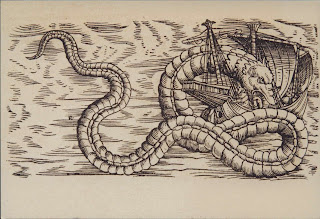In both cases, the occupying / invading army consisted largely of poorly motivated conscripts, experienced discipline problems, relied on overwhelming, indiscriminate firepower (artillery or bombing) and had an unrealistic assessment of the situation (and of both their own and enemy capabilities).
By contrast, the invaded countries (Ukraine and Vietnam) were highly motivated while being numerically inferior; both were also backed by a super power (the United States and the USSR/China).
I've been doing some reading and this is what I've come up with. I'm putting it down mostly for my own sake, to make sense out of what's happening, and try and understand where it may be headed.
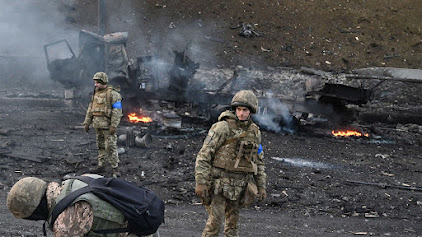 |
| The end of a Roland Emmerich movie or Ukraine? You decide |
Background
Ukraine had one hell of a tumultuous 20th century. Towards the end of World War I, Ukraine made a pact with the Central Powers to provide grain in exchange for driving the Bolsheviks out. Cossack General Skoropadsky established a Ukrainian Hetmanate in April, 1918, but fled with the German surrender in November.
A French military expedition to Odessa and Crimea followed, but quickly withdrew ahead of a Soviet invasion. That was rolled back by a Polish-Ukrainian alliance, which collapsed when Poland made peace with the USSR. Ukraine officially became a Soviet in 1922.
The Holodomor followed in the 1930s, during which 3 to 5 million Ukrainians are estimated to have died during an engineered famine.
World War II killed almost 7 million Ukrainians (1.5 million of them Jewish, often killed with the help of their neighbours), roughly 16% of the entire population. The UPA (Ukrainian Insurgent Army) assisted the Germans. Some 80,000 Ukrainians joined the Waffen SS, while others served as concentration camp guards. Anti-semitism ran deep across Eastern Europe. This is where the Nazi slur against Ukraine comes from. A total of around 250,000 Ukrianians assisted the Axis (although arguably some were fighting more for Ukrainian independence and amorally using whatever ally was convenient).
 |
World war II casualties broken down by nation: Russia gets almost half the pie
|
To put it in perspective, 4.5 million Ukrainians fought for the Soviet Union. And to be fair, hundreds of thousands of Russians fought for the Axis (600,000 Hiwi under arms in 1944 alone), including the Russian General Vlasov. A quarter of the troops in the German Sixth Army were former Soviet subjects. Given the barbarity of the German occupation, that's astonishing. The German General Plan for the East called for a reduced population employed as slaves, with the majority being killed off through starvation (grain would instead be shipped back to feed Germany). Nothing but the most rudimentary education (reading sign posts, for example) was to be provided for the population moving forward. The Nazis were taking a page from the Spartans, who kept uneducated Helots to do the hard work. By 1944, the Nazis had been driven out of Ukraine, although Ukrainian nationalists continued fighting an insurgency in Western Ukraine against Soviet domination until as late as 1954. Timothy Snyder, no relation to Zach, dubbed the region between Berlin and Moscow ‘The Bloodlands’, because armies kept running over it, then backing up and running over it again and again. It inspired George Orwell’s depiction of conflict between the superstates Oceania, Eurasia and Eastasia in 1984. I wrote about that here.
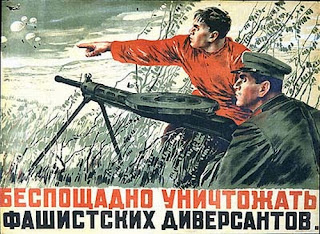 |
| Shoot that guy: inspirational Soviet propaganda poster |
In 1991, Ukraine became an independent nation again. It retained Crimea, assigned to it by Nikita, and a large nuclear arsenal. Clinton persuaded them to give the nukes up in 1994 in exchange for pieces of paper guaranteeing Ukrainian security.
 |
| The piece of paper that guaranteed Ukrainian security, in exchange for surrendering their nuke arsenal |
In 2014, 'Little Green Men' occupied Crimea and pro-Russian insurgents seized part of the Donbas (The NVA infiltrated South Vietnam all while also denying they were there). Russia also began funding gangs to rabble rouse across Eastern Ukraine.
The rest is current events: Russia has attacked on at least four fronts (North, South, Northeast and East) against a numerically comparable enemy, without unified command. The have failed to establish air superiority, adequate logistical support or even discipline amongst their troops.
Like Ukraine, Vietnam spent decades subsumed in a foreign political unit, as part of the French colony of Indochina. Ho Chi Minh initially approached the Americans for support for Vietnamese independence, as there had been an anti-colonialist streak in American foreign policy before the Second World War, but that died the minute the Cold War began.
Japanese occupation broke any mystique the French had, and when France attempted to reassert control over Indochina, Minh declared independence. Despite the Americans footing the bill, by 1954 the French were ready to call it quits. Indochina split into three new nations: Laos, Cambodia and Vietnam.
Vietnam was divided into a communist North and an ostensibly democratic, but in truth deeply corrupt and autocratic, South.
During the Advisor Period that followed, with up to 16,000 American military consultants backed by airpower. Viet Cong attacks on American airfields dragged in American ground troops, ushering in Johnson's War. Tet finished Johnson politically and shattered American morale, even while annihilating the VC, who never again fielded troops at battalion level. NVA command had expected their attack to inspire an uprising against the Americans across South Vietnam (rather akin to how Bin Laden expected an uprising after 9/11); they were out of touch and projected on to the South their own values and beliefs. No mass pro-communist uprising occurred. On the other hand, the result they got was almost as good. It's one of those rare occasions where a military won the war by losing the battle(s).
Nixon was up to bat next, but even as he bombed the crap out of Cambodia and the North, he was looking for a way out. By 1973, US troops had vacated the arena. In 1975, North Vietnam plowed into the power vacuum and South Vietnam imploded. In less than two months, NVA tanks rolled into Saigon, just like Russian tanks didn't in Ukraine.
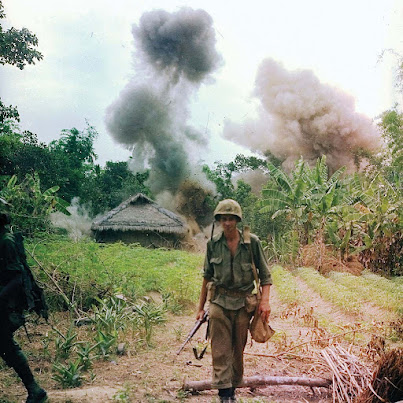 |
| American troops visit a Vietnamese village |
The 'Imperial' Armies
The Russian army has a history of stumbling out of the gate. The Russo-Japanese war of 1905 resulted in total humiliation, which was followed by a disastrous performance in World War One. That resulted in mutinies, revolution, defeat at the hands of Poland in 1920, and stunning failure in the 1939-40 Winter War with Finland.
Stalin gutted the officer corps in 1937. Some argue this purge was to replace old cavalry officers with more forward thinking ones. This doesn’t explain why Tukachevsky, an innovative thinker, military theorist, and advocate of tank warfare and deep penetration operations, was arrested and shot, along with thousands of others. He was rehabilitated and absolved of all charges in 1957. Their replacements were more noteworthy for political reliability than forward thinking tactics, and their lack of ability was on full display during both the Winter War and the Nazi invasion of the ussr in 1941. Over the next two years, large numbers were retired and replaced with the battle proven.
 |
| Russian troops relaxing in the Winter War |
That’s the Russian Army’s general pattern: get a bloody nose, or beaten within an inch of it’s life, then reform and regroup (already underway in Ukraine), and attack again. It’s an iterative approach that grinds through Russian soldiers, but Russia has always been willing to suffer high casualty rates. Their system is designed that way.
Putin cannot afford to lose. He's a strongman, and he maintains his position by being the toughest mofo in the neighbourhood. If his war fails and he's turfed, it won’t be to a cozy retirement at his billion dollar dacha. More like a mud pit with a bullet at the back of his skull. Apparently Putin has been obsessed with watching videos of Gaddafi's demise.
As such, it would be folly to count the Russian army out. Russia suffered 11 million casualties in World War Two, and still went on to crush the highly trained Nazi war machine, like some kind of gestalt zombie Rocky Balboa.
Ukraine, however, is not the Great Patriotic War; it’s an unprovoked 'very special operation' of choice against a fellow Slavic nation. Russian troops are not fighting a genocidal force bent on extermination of the majority and enslavement of the remaining, the Azov Battalion notwithstanding. Some policy wonks say Lukashenko refrained from entering Belorussia into the fray because he knew he’d be overthrown if he did. They Belorussian Army just isn't into it.
Russian conscripts have understandably low motivation, and a few units have refused to fight in Ukraine, against their fellow Slavs.
The United States military in the early Seventies had numerous problems (including low motivation) but logistics wasn't one of them. To meet the troop requirements for Vietnam, however, they needed conscription. That wasn't popular with affluent American kids, who objected to being shipped off to fight in far away, deadly jungles against an unseen enemy.
George Lucas famously based The Emperor on Richard 'Tricky Dicky' Nixon, and cast the Viet Cong as Ewoks in Return of the Jedi.
 |
| A kinder, cuddlier Viet Cong: The Ewok |
For Lucas, The United States was The Evil Empire.
While the US Marines experimented with pairing units and villages, then funneling in cash to build infrastructure to benefit the locals (a strategy later adopted in Iraq and Afghanistan), Westmoreland thought this path was folly, and preferred mass sweeps through jungle. Against the agile VC, this was both futile and time and resource consuming.
Russian forces in Ukraine have been filmed handing out a few meal kits, but there are no reports of extensive support or community outreach in occupied territories. It is also unclear what efforts, if any, have been made to restore electricity or water supply to damaged neighbourhoods. The Russian army is having difficulty feeding its own troops, much less tens of thousands of civilians and refugees, and they may not even want to: famine has been a weapon of war for the Soviets in the past.
This has the makings of a large scale humanitarian disaster.
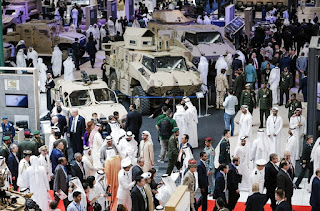.jpg) |
| Get yer billion dollar APCs here! |
Superpowered support
The United States backed South Vietnam to the tune of $18 billion. Eventually Congress cut off the war juice and the AVRN collapsed in 1975. The war scarred the American people as well as Congress, and numerous amendments were passed to ensure such a disaster didn’t happen again. The Nixon Doctrine called for supplying arms to regimes important to American security in the hope of avoiding the commitment of American combat troops later. Restrictions were put in place to weed out human rights abusers.
We all know how that's worked out.
In 1968, the United States had 549,000 troops in South Vietnam; China had 320,000 troops in the north; they were supplying guns, ammunition, artillery and food, as well as manning the anti-aircraft guns. That dropped off as the Sino-Soviet rift developed, with the USSR picking up the slack. The USSR (Vietnam's preferred supplier) contributed 300 million rubles worth in 1965, including planes, tanks, artillery, ammo and anti-aircraft guns. They also shipped hundreds of factories to north Vietnam. Ultimately, little war production was actually done in Vietnam, so the American bombing campaigns may have accomplished little. Most equipment was shipped in by sea by the USSR or rail by China, and the US refrained from bombing those routes or mining the ports for fear of sparking a larger war.
The US and European Union are currently pouring hundreds of millions of dollars worth of weaponry into Ukraine through Poland. Without these weapons, Ukrainian resistance would be severely hobbled.
Political leaders of North Vietnam wanted a quick victory, but Giap felt the only way to win was through a longer guerilla war which China supported. Vietnamese leadership were highly suspicious that China wanted to fight to the last Vietnamese citizen. The same accusations are now being levelled by many (including John Mearsheimer) against the United States in regards to Ukraine.
Ukraine has a lot of military age males, and there doesn't seem to be any cap on the funding of the Ukrainian war effort by NATO. Russia, on the other hand, is under heavy sanctions and will have difficulty replacing smart bombs and high tech vehicles (Amarta tanks and fighter planes) as time goes on.
 |
| Soviet forces roll into Afghanistan |
Moh motivation
Hi chi Minh famously said, you can kill ten of us to your one and we will still win.
A famous anecdote has an American officer observing: “They are fighting against helicopter gunships with pointed sticks. How can they expect to win?” To which another replies, “If they’re willing to do that, how can we hope to defeat them?” It's an interesting point. Against that kind of determined resistance the only victory is a Roman one: kill (or enslave, the Romans were big on enslaving) everyone and sow the earth with salt.
Of course weapons (and terrain) still make a difference. The Soviets were gaining the upper hand (using attack helicopters) in Afghanistan when stinger missiles, supplied by the Americans, helped turn the tide. But as Napoleon apparently said, "The moral is to the physical as three is to one."
We've heard of cases where Russian troops have 'fragged' their own officers. There were cases in Vietnam where American conscripts did same. Neither war was existential to the invader, and troops resented being sent in for less than compelling reasons.
Ukraine, on the other hand, is fighting for its very right to exist, which is a much more powerful motivator.
Civilian casualties and dumb bombs
The MCAV (Military Assistance Command, Vietnam) required body counts from units in the field: that was established as the measure for success in Vietnam. Not the smartest decision the US military has ever made.
According to Gunter Lewy (and Wikipedia) 1/3 of enemy KIA were civilians, for a total of 220,000 civilian deaths over the course of the war. That's not including bombing casualties in Laos, Cambodia or North Vietnam.
Soldiers were encouraged to make up kill counts if they didn't know the actual numbers. Accuracy wasn't the paramount concern: the military bureaucracy had a box to check, and everyone going up the chain of command needed a number. But who's going to comb through dangerous jungle, or tunnels, for bodies? The numbers were often pulled out of thin air.
 |
| American troops used helicopters to bypass jungle and ambushes |
Free Fire Zones were established in which anyone who was unidentified or out after curfew could be shot on sight. Given the incentive system, civilian casualties seem inevitable.
According to Vietnam: 50 Years Remembered, American infantry averaged 240 days of combat per year in Vietnam, but only 10 days in WWII. An incredible statistic which, if true, suggests enormous psychological stress on the GIs in Vietnam, contributing to poor decision making.
In Ukraine, Russia has deliberately shelled residential neighbourhoods, causing mass casualties. Body count may not be a success measure, but terror seems to be part of their modus operandi. Russian troops have also (reportedly) engaged in extensive rape, looting, torture and murder.
To be fair, that's pretty common in war. US troops committed atrocities in Vietnam (My Lai was just the most publicized example) and there were unintended strikes against civilians in both Iraq and Afghanistan. Even so, the modern American military exhibits both a significantly higher level of professionalism, and avoidance of civilian casualties, than the RF.
The Russians are deliberately targeting civilian neighbourhoods with artillery. Mariupol has been flattened, with an estimated 5,000 civilian casualties. Mass graves have also been uncovered in areas evacuated by Russian troops north of Kyiv.
Troop levels
At it's peak, the United States had 543,000 personnel in Vietnam, supported by roughly 700,000 ARVN troops. The population of South Vietnam was 16 million. North Vietnam had a slightly larger population of 18 million. And yet, even with over 1.2 million men at their disposal (six times the number of Russian troops in Ukraine, a country almost three times the population of South Vietnam), supported by air power and artillery, the US and South Vietnam could not solidify their control.
The NVA and VC had some 100,000 troops in South Vietnam, virtually all of whom were replaced annually due to extremely high casualties. Giap said that by 1969 the North had already suffered 500,000 casualties, but that wasn't going to stop them: "The life or death of a hundred, a thousand, tens of thousands of human beings, even our compatriots, means little."
Iraq has a population of 40 million; US troop levels ranged between 130,000 to 187,000 between 2004 and 2009, not including private contractors or Iraqi security forces. Prior to the invasion, General Shinseki estimated that 260,000 troops would be required to successfully occupy Iraq. They never came close, and until local militias were co-opted, the country was notoriously unstable.
The Russian army entered Ukraine, a country of 44 million, with roughly 180,000 troops and 2,840 tanks. That's comparable to the troop levels the Americans deployed in Iraq, but there's a marked difference in capabilities and professionalism. America's all volunteer army has higher morale and greater dedication, along with the support of NCOs and contractors.
Deployed against the Russians are (were?) 215,000 active Ukrainian military personnel supported by 2,550 tanks.
So far, Russian forces have suffered the verified loss of at least 450 tanks and over 800 supply trucks. Ukrainians have ambushed Russian columns (the Russians aren't screening their tanks with infantry) as they advanced, which is the same strategy the VC used against the French in Vietnam. They attempted it against the Americans too, but the US moved troops via helicopter and leapfrogged over the ambush sites.
Russian casualty figures range from 8,000 to 20,000 for the first month. By comparison, 6,990 Americans were killed in Vietnam in the first nine months of 1967. It took ten years for the USSR to suffer comparable casualty figures in Afghanistan.
Are these fair comparisons? Vietnam, Iraq, and Afghanistan were all counter-insurgency wars, with great force disparities, so lower casualty figures for the dominant side would be expected. And of course casualty figures should be taken with a massive grain of salt. Both sides are trying to spin the stats.
Compared to American troop levels in Vietnam and Iraq, it's difficult to believe Russia will be able to successfully occupy Ukraine given the forces it has deployed (if that even is the intent, which it probably isn't).
 |
| B-52 bombers drop freedom |
Interdiction of supplies
The connection to NATO through Poland is crucial to the survival of Ukrainian resistance. Ukraine would not have managed to rearm and retrain so effectively since 2014 without American (and NATO) support.
So far, Russia has refrained from firing missiles at rail cars crossing into Ukraine, but that may change if the war continues to go poorly for Russia.
The Ho Chi Minh trail was the lifeblood of the Viet Cong, pumping in weapons and supplies, although American Intelligence estimated only 10 to 15 tons was necessary to sustain the VC daily (Ukraine needs far more). Nixon ordered a bombing campaign in Cambodia, Operation Freedom Deal (no, seriously), to cut it off. Over 250,000 tons of freedom bombs, more than everything dropped on Japan in World War II, was pasted across southern Cambodia.
This was before America entered the era of smart bombs, which Russia has only dipped it’s toe in. Russian stockpiles of smart weapons are extremely limited. Having failed to obtain air superiority in Ukraine, Russia is relying on their much vaunted artillery forces, which cause a lot of collateral damage (in many Russian wars, that's part of the point and policy).
Nixon believed in the Mad Man theory (no, not advertising), and sought to intimidate his opponents with irrational and crazy escalations, like flattening Cambodia behind the back of Congress. Putin’s taken a page from Nixon’s play book with his pointed threats of nuclear retaliation if anyone even thinks of looking at him sideways. Does it work? It didn't for Nixon.
The USAF claimed their bombs killed 16,000 Khmer Rouge troops besieging Cambodian capital Pnom Penh in 1973, saving Cambodia from falling to the communists… that year. Others say the bombing galvanized Cambodians to fight and led directly to Pol Pot's victory. Civilian casualty estimates range from 30,000 to 300,000; it’s very difficult to know for certain because there were so many other active efforts to kill people going on at the time.
Interdiction efforts failed in Vietnam, Afghanistan and Iraq. In every case the invader eventually withdrew, but only after a great expenditure of money, equipment and human lives.
While American withdrawal from Vietnam may have been a kick in the nuts, Russian withdrawal from Ukraine will be unbearable. NATO supplies are empowering Ukraine and blocking Russian victory. Sooner or later the RF are going to try and cut Ukraine's war juice off, risking a wider war.














.jpg)








